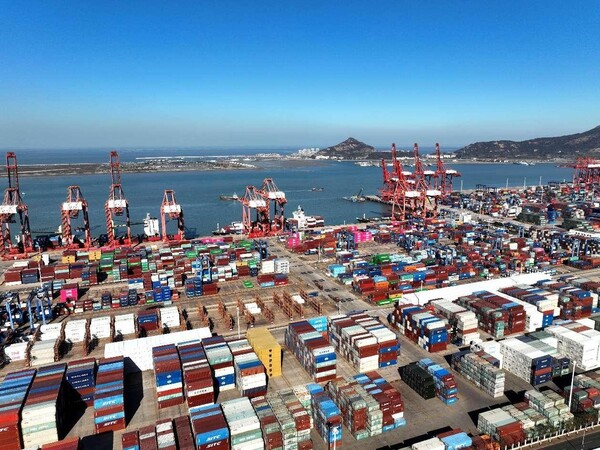By Qiu Haifeng
China advances RMB internationalization
By Qiu Haifeng
The Chinese currency Renminbi (RMB), or the yuan, has been increasingly used as international currency in recent years, gaining popularity as a payment, investment, and reserve currency in the global market.
As China's economy recovers and its financial market further opens up, the yuan's investment and hedging functions have strengthened.

Panda bonds, or yuan-denominated debts sold by foreign issuers in China, have been well-received.
According to the 2023 Yuan Internationalization Report released by the People's Bank of China (PBOC), China's central bank, 58 panda bonds were issued from January to August 2023, totaling 106 billion yuan ($14.79 billion). This represents a year-on-year increase of 58.2 percent, surpassing the total number and amount of issuances from the previous year.

The macro-prudential management bureau of the PBOC announced on November 9 that various channels for mutual stock market access, such as the Shanghai-Hong Kong Stock Connect, the Shenzhen-Hong Kong Stock Connect, mutual recognition of funds, Bond Connect, the Shanghai-London Stock Connect, and the Cross-boundary Wealth Management Connect, have been opened and optimized.
The policy framework for supervising qualified investors has been consistently enhanced and it has become easier for foreign entities to issue panda bonds. Additionally, Chinese stocks and bonds have been incorporated into major international indices. These developments have collectively contributed to an enhanced investment and financing environment for the yuan.
As of the end of September 2023, a total of 1,110 foreign institutions had entered the Chinese bond market, holding 3.3 trillion yuan in Chinese bonds, an increase of nearly 200 percent compared to five years ago. Domestic RMB financial assets held by overseas entities, including stocks and bonds, had reached 9.3 trillion yuan.
As foreign institutions continue to expand their presence in the domestic bond market, offshore yuan trading has also witnessed a surge in activity.
In late October, two yuan clearing banks were inaugurated, including one in Islamabad, Pakistan, which marked the official launch of yuan clearing services in the country. Additionally, the Industrial and Commercial Bank of China (ICBC) Vientiane Branch in Laos held a ceremony to commence yuan clearing services. This development increased the number of yuan clearing banks established by China in Southeast Asia to five.
"The yuan is assuming a growing significance in the global economy and financial markets," stated Jameel Ahmad, governor of the State Bank of Pakistan. The establishment of a yuan clearing bank will help reduce costs for local banking systems and support Pakistani businesses in exploring new markets, thereby contributing to the long-term development of the Pakistani economy and banking system, Ahmad added.
Since 2022, China has established yuan clearing banks in Laos, Kazakhstan, Pakistan, and Brazil. It has continuously enhanced the overseas yuan clearing network, resulting in smoother cross-border transactions for trade and investment. Presently, the PBOC has authorized 31 yuan clearing banks in 29 countries and regions, encompassing significant international financial centers globally.
"Since last year, the connectivity and cooperation between domestic and foreign financial markets have strengthened, resulting in a broader selection of offshore yuan products and enhanced facilitation and liberalization of cross-border investments," stated a representative from the PBOC.
According to a survey by the Bank for International Settlements (BIS), the yuan's market share in global foreign exchange transactions has surged from 4.3 percent to 7 percent in the past three years. This has resulted in a rise in its ranking from the eighth place to the fifth.
This growth has made the yuan the currency with the fastest-growing market share, as offshore entities increasingly adopt it for foreign exchange and risk management purposes.
Multiple sectors have shown optimism regarding the future prospects of the yuan's internationalization.
Argentina has announced its plan to use the equivalent value of yuan under the China-Argentina currency swap agreement to repay its external debt and interest owed to the International Monetary Fund. This decision comes after Argentina's previous use of the yuan to repay matured external debt at the end of June.
In July 2023, the Bolivian government announced that the state-owned bank Banco Unión has started trading operations involving the yuan. Marcelo Montenegro, Bolivian Minister of Economy and Public Finance, stated that the yuan trading operations have gotten off to a good start in the country. Montenegro highlighted the potential for increased utilization of the yuan within the framework of the Belt and Road Initiative (BRI).
"More countries are now participating in yuan transactions, and the internationalization of the currency is advancing rapidly," Montenegro expressed. He further stated that the yuan is expected to play a more significant role in future international trade activities.
More companies have expressed their confidence in the yuan. The PBOC recently released the Market Survey on the International Use of the RMB in 2022.
The survey, conducted among over 3,600 domestic and foreign commercial enterprises, found that around 82.8 percent of the companies are considering using the yuan in cross-border transactions or increasing its usage. This represents the highest level in recent years. Additionally, 71.8 percent of the foreign commercial enterprises surveyed expressed a preference for using the yuan as the currency for trade financing with China, marking the highest intention in the past three years.

